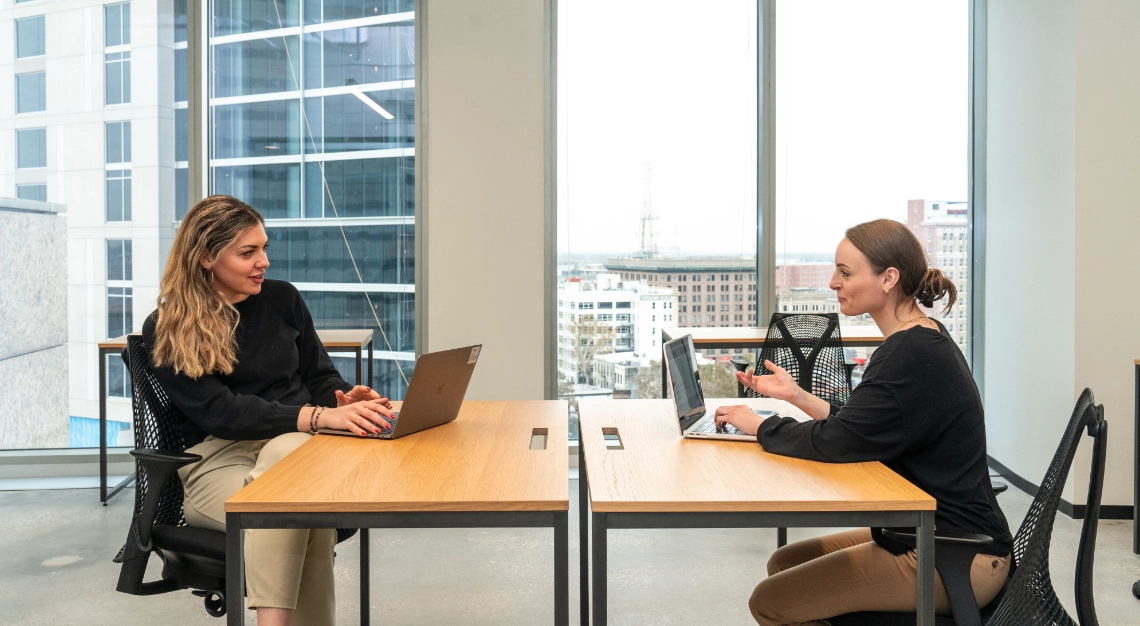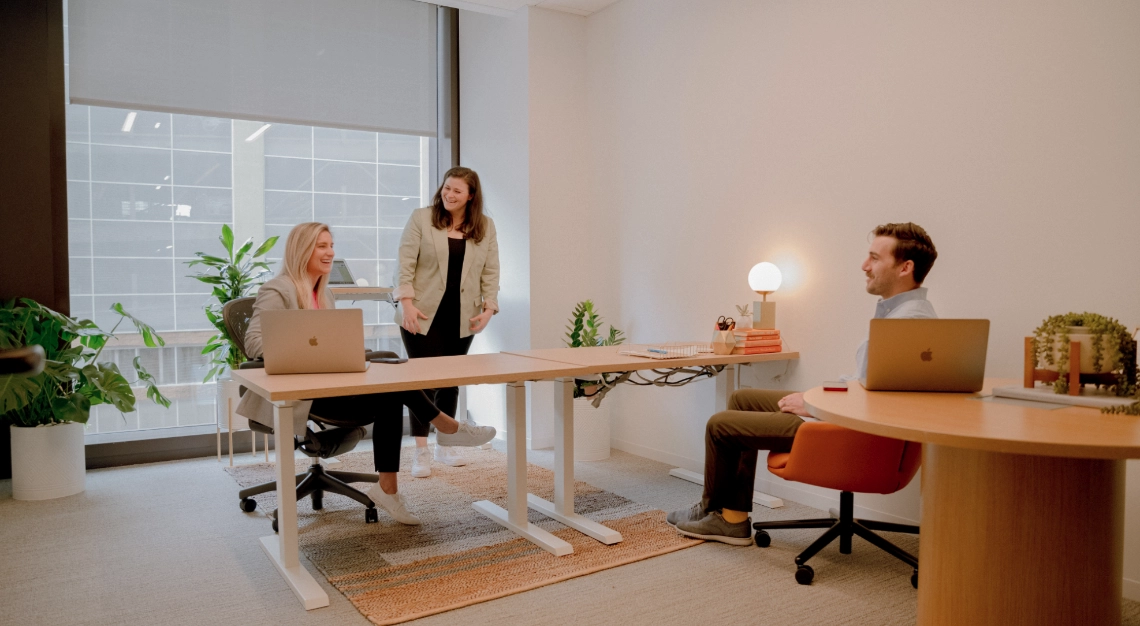Shared Workspaces 101: How They Work and Why You Need One

Shared workspaces and coworking spaces, two innovative concepts in today's professional world, are redefining the way people work. These modern work environments offer remarkable solutions to the ever-evolving needs of professionals and businesses.
Whether you're looking for shared workspaces in Washington DC, shared workspaces in Houston, Mexico City or Salt Lake City, The Square will help you navigate the world of modern work environments.
How Do Shared Office Spaces Work?
Shared office spaces, often referred to as shared workspaces, provide professionals with access to a communal workspace where individuals from different teams or companies come together in a shared area. These spaces offer a cost-effective solution, allowing employees to access professional workspaces with amenities they might not have in a traditional office setup.
Access and Amenities:
In shared workspaces, you gain entry to an efficient, open office space shared with a network of professionals, including remote workers, freelancers, small teams, and entrepreneurs. You typically choose your workspace on a first-come, first-served basis. These spaces come equipped with high-speed Wi-Fi, electrical outlets, and often include kitchen areas and other amenities for a productive workday.

Benefits of Shared Office Spaces:
Shared workspaces offer numerous benefits, making them an attractive choice for many professionals and small teams. These benefits include:
- High-speed Wi-Fi and professional amenities
- Discounted access to meeting and conference rooms
- Proximity to desired areas
- Ergonomic furniture
- A creative, driven atmosphere
- Networking and collaboration opportunities
- A flexible workspace that adapts to your needs
- A lower price tag compared to traditional private offices
When to Consider Traditional Offices:
Shared workspaces are ideal for individual professionals and small teams. But if you require privacy for meetings, a private office may be a better choice. Private offices also cater to larger teams that need dedicated space without sharing it with employees from other companies.
Shared Workspaces vs. Coworking Spaces
Here are some key differences between shared workspaces and coworking spaces.
Shared Workspaces:
- Shared workspaces are generally broader in scope and can refer to any workspace that is used by multiple individuals or organizations.
- They can include traditional office spaces where multiple companies or individuals share the same building or floor but have separate offices or work areas.
- Shared workspaces can also encompass environments like libraries, coffee shops, or community centers where people work alongside each other but don't necessarily have a formal membership or shared amenities.
- Shared workspaces may not always involve a membership fee or require participants to work in close proximity to each other.
Coworking Spaces:
- Coworking spaces are a specific type of shared workspace designed to foster collaboration, community, and networking among individuals and small businesses.
- These spaces are often open-plan offices where freelancers, remote workers, entrepreneurs, and small teams can rent desks or dedicated workspaces.
- Coworking spaces typically provide various amenities such as high-speed internet, conference rooms, communal areas, and sometimes even on-site cafes.
- Memberships or rental agreements are common in coworking spaces, and individuals or businesses pay for access to these facilities.
In summary, while shared workspaces can encompass a wide range of settings where people share workspace resources, coworking spaces are a specific subset of shared workspaces that emphasize community, collaboration, and the provision of amenities and services to support productivity and networking. Coworking spaces have gained popularity as flexible and dynamic work environments that cater to the needs of freelancers, remote workers, and small businesses.

Shared Workspaces: A Solution for Diverse Professionals
Shared workspaces are utilized by a wide range of professionals, from startups to remote employees, and appeal to small businesses and digital nomads alike.
Entrepreneurs and Freelancers:
Entrepreneurs and freelancers often find shared workspaces ideal, especially if they lack dedicated office space at home. These spaces offer a professional environment, making it easier to focus and be productive.
Remote Teams:
Teams that primarily work remotely can benefit from shared workspaces for occasional in-person meetings. Shared workspaces provide an economical solution for businesses with distributed teams, allowing them to come together without the overhead of leasing a traditional office.
Digital Nomads:
For digital nomads, shared workspaces provide a consistent and reliable workspace while travelling. You can plan your trips around cities with these types of workspaces available, ensuring you have a productive environment and reliable internet access.
Shared Workspace vs. Collaborative Workspace
There's a common misconception about shared workspace and collaborative workspace. Shared workspace refers to an individual occupant using space for a limited time, with the workspace becoming available for someone else when they leave. Collaborative workspace, on the other hand, involves many people using the same space simultaneously to work together on specific tasks.
Shared Workspaces, Coworking Spaces, and Shared Offices
The rise of coworking has led to some confusion about the terminology used in modern office spaces. While coworking and shared workspaces are often used interchangeably, they differ from shared office spaces.
Shared Workspaces (Coworking Spaces):
These are individual workstations rented by remote employees, freelancers, consultants, and others who may not have a central office. It's one space for one individual.
Shared Office Spaces:
Shared office spaces are larger workplaces rented for multiple people in a similar fashion. They differ in the amenities and resources offered, catering to small companies with perks, tech, and features designed for a broader group.
Benefits at Every Level
Understanding these distinctions is crucial for leveraging the right workspace solution for your needs.
- Collaborative Workspaces: Ideal for companies with their own real estate, offering flexibility in how the space is used.
- Shared Workspaces: Provide flexibility for employees without permanent desks and allow companies to reduce overhead costs.
- Shared Office Spaces: Suited for startups and agile companies needing occasional office space and access to workplace resources.
Transforming The Way We Work Through Shared Workspaces
